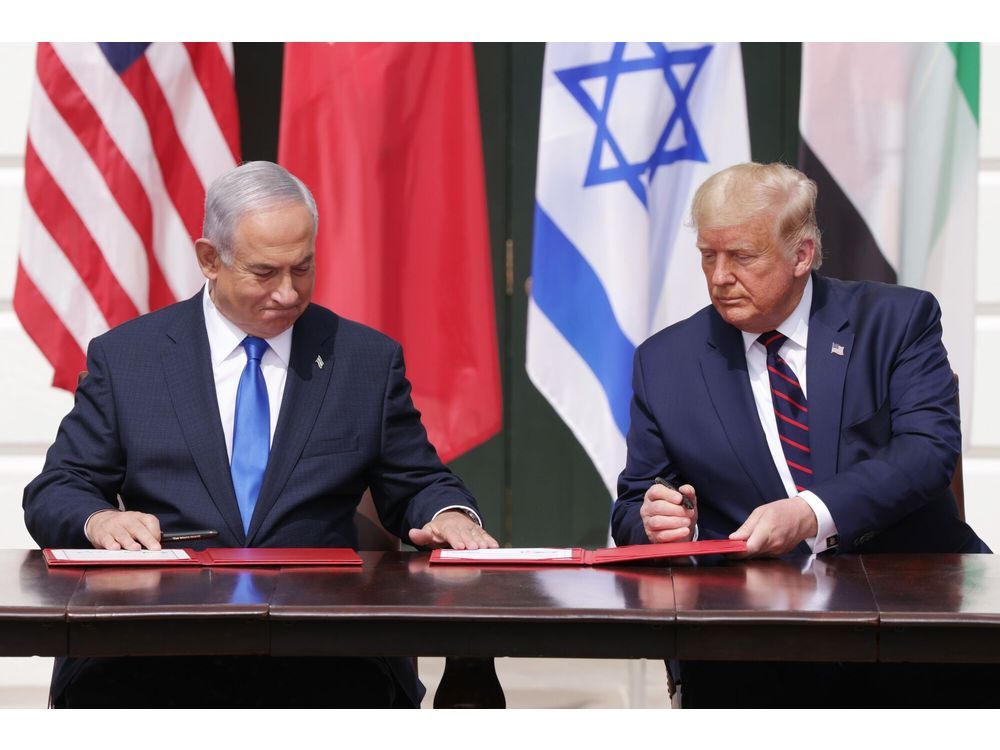Top Stories
Arab-Israel Normalization in Crisis After Qatar Airstrike

UPDATE: Tensions escalate in the Middle East as Israel’s unprecedented airstrike on Hamas leaders in Doha, Qatar, has sent shockwaves through the region, jeopardizing the fragile normalization efforts between Israel and Arab nations. This critical development, occurring just days after the attack on October 7, 2023, has raised alarms among US-allied Gulf states, prompting urgent defense meetings to reassess regional security strategies.
The aftermath of the airstrike has significantly strained ties, particularly as UAE President Sheikh Mohamed Bin Zayed has refused to meet with Israeli Prime Minister Benjamin Netanyahu. Relations between Israel and Arab nations—once buoyed by the 2020 Abraham Accords—are now facing unprecedented challenges. According to sources, Saudi Arabia’s Crown Prince Mohammed Bin Salman has openly condemned Israel, marking a stark shift from previous normalization discussions.
As regional anger surges, experts warn that the ramifications of Israel’s actions could obliterate any remaining goodwill. Former US State Department official Barbara Leaf noted, “The broader region is in complete rage,” emphasizing that the chances for new normalization agreements are virtually nonexistent.
In a statement released on Thursday by the Gulf Cooperation Council, member states are convening to assess the threats posed by Israel’s military actions, drawing parallels to previous responses to Iranian aggression. The sentiment across the region has shifted, with many now viewing Israel as a primary threat to stability and peace.
Turkish Foreign Minister Hakan Fidan echoed these concerns, stating, “Today, it is not only about the occupation of Palestinian lands or the genocide in Gaza, but also about Israel’s expansionism posing a major threat to regional countries.” This alarming rhetoric signals a significant shift in regional dynamics, as countries reconsider their relationships with Israel.
The airstrike’s fallout has also raised questions about existing peace treaties. Egyptian President Abdel-Fattah El-Sisi warned that Israel’s actions could obstruct future agreements, stating at a summit in Doha, “Israeli action obstructs any prospects for new peace agreements.” Egypt, the first Arab country to recognize Israel in 1979, may reevaluate its treaty in light of potential Palestinian displacements into the Sinai Peninsula.
Similar concerns are echoed in Jordan, where officials view plans for further Israeli annexation as an existential threat. Former Jordanian Foreign Minister Marwan Muasher criticized Israel’s military actions as exceeding any reasonable self-defense claims, heightening tensions around normalization efforts.
Despite this growing backlash, Israeli and US officials are maintaining a degree of optimism regarding the Abraham Accords. A State Department spokesperson expressed hope that “President Trump’s strong leadership can expand the circle of peace,” framing the recent violence as a potential opportunity.
However, skepticism abounds. Observers note that the Abraham Accords—initially intended to separate normalization from the Israeli-Palestinian conflict—are now under immense strain. The UAE has signaled it may reconsider its agreements should Israel pursue further annexation, calling it a “red line.”
As the situation continues to evolve, the stakes could not be higher. A senior UAE official stated, “Everything is on the table,” reflecting the growing concern among Gulf states that Israel’s actions could undermine years of diplomatic progress.
The final communique from the Doha summit urged Muslim nations to consider imposing sanctions on Israel and reassess their diplomatic ties, a clear indication of the escalating regional response to Israel’s military strategy.
With emotions running high and regional stability hanging in the balance, the unfolding crisis represents a pivotal moment for Arab-Israeli relations, with the potential to reshape alliances in the Middle East.
-

 Politics4 weeks ago
Politics4 weeks agoSecwepemc First Nation Seeks Aboriginal Title Over Kamloops Area
-

 World5 months ago
World5 months agoScientists Unearth Ancient Antarctic Ice to Unlock Climate Secrets
-

 Entertainment5 months ago
Entertainment5 months agoTrump and McCormick to Announce $70 Billion Energy Investments
-

 Science5 months ago
Science5 months agoFour Astronauts Return to Earth After International Space Station Mission
-

 Lifestyle5 months ago
Lifestyle5 months agoTransLink Launches Food Truck Program to Boost Revenue in Vancouver
-

 Technology3 months ago
Technology3 months agoApple Notes Enhances Functionality with Markdown Support in macOS 26
-

 Lifestyle3 months ago
Lifestyle3 months agoManitoba’s Burger Champion Shines Again Amid Dining Innovations
-

 Top Stories2 months ago
Top Stories2 months agoUrgent Update: Fatal Crash on Highway 99 Claims Life of Pitt Meadows Man
-

 Politics4 months ago
Politics4 months agoUkrainian Tennis Star Elina Svitolina Faces Death Threats Online
-

 Sports5 months ago
Sports5 months agoSearch Underway for Missing Hunter Amid Hokkaido Bear Emergency
-

 Politics5 months ago
Politics5 months agoCarney Engages First Nations Leaders at Development Law Summit
-

 Technology5 months ago
Technology5 months agoFrosthaven Launches Early Access on July 31, 2025





















